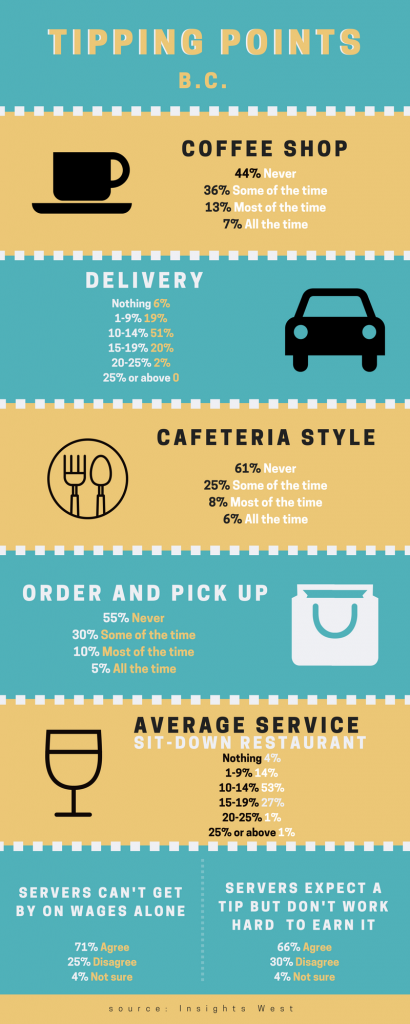Minimum-wage earners left in the lurch when B.C. residents skip the tips
44% of B.C. residents never tip in coffee shops according to a recent survey
While many British Columbians will throw down a few dollars for a coffee to wake up in the morning or to take advantage of free WiFi, an overwhelming number of people walk away without leaving anything in the servers’ tip jar.
Baristas don’t receive tips from 44 per cent of British Columbians
Forty-four per cent of B.C. residents never tip in coffee shops, according to a recent survey by Insights West. Metro Vancouver residents are among the stingiest.
And when Mario Canseco, vice-president at Insights West, went on talk shows to explain the data, he was surprised by the impassioned response. What it reveals, he says, is a picture of how we interpret service.
 Really, this shouldn’t be a surprise.
Really, this shouldn’t be a surprise.
People have different rationales based on whether someone brings food to your table, how complicated the drink is, how expensive the order is to begin with, and a number of other factors. One thing is clear: tipping policies are personal.
The online treasure trove of emotional think pieces on the topic proves that individuals aren’t afraid of staking out their opinions on tipping.
A recent opinion piece from The Daily Hive, a Vancouver online publication, titled “Why I’m Sick of Automatic Tipping,” rails against the many service jobs that the author considers unworthy of an extra 15 to 20 per cent. It concludes with a mic drop that will surely change the way the service industry in this province pays its employees:
“Give me the opportunity to decide whether or not I want to give you a tip. And if you try to decide for me with your ridiculous automatic tip options? I can guarantee I’ll hit $0 every time,” wrote Amy Beeman.
Digital payment methods force people to think more and leave less
The shift towards digital payment methods hasn’t gone unnoticed by Canseco, either. He says the pressure to take the extra time to calculate the tip on the screen has an impact on people’s thought process.
“It might be a natural reaction to drop a couple of dimes in the jar and walk away,” says Canseco. “The machine changes that” when it forces you to think about how much you really want to leave.
Barista Alexandra Jones says she takes notice of customers who don’t tip when paying digitally.
“If someone pays in cash and doesn’t tip, I can understand that,” says Jones. “Maybe they needed their change for bus fare. But the Interac machine at my shop has a specific screen that prompts you for tips, so if you’re paying with debit or credit, you don’t get to passively ignore the issue of whether to tip or not.”
Minimum wage earners under strain in an expensive city
Tipping is about more than just a personal gesture for servers. Even the recently raised minimum wage of $10.85 per hour, a common salary for coffee-shop workers, isn’t enough for many people to live on, especially in one of Canada’s most expensive cities. Vancouver’s living wage is estimated at $20.64. Canseco says this, in combination with high rents for commercial spaces, makes small businesses less receptive to paying employees more money.
“Minimum wage is already low, and when that is tied to obscene real estate prices, you have an issue,” says Canseco.
Experience lends empathy – and small change
Politics aside, people with generous tipping policies tend to be those who have been on the other side of the counter – a factor that may explain why millennials are more likely to leave at least a small tip in most situations. Two out of five of people over the age of 55 will leave nothing if service was not satisfactory.
After working in a café for over a year, Shannon McMullin says she “always overtips” when purchasing food at an outlet.
“If it was actually bad service, they still get 15 per cent because I don’t know what they’re dealing with on the floor that day, and everyone deserves a living wage.”
